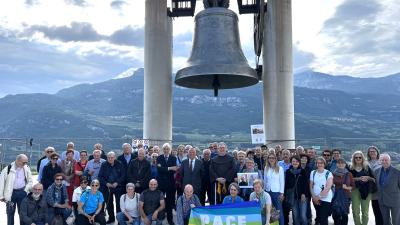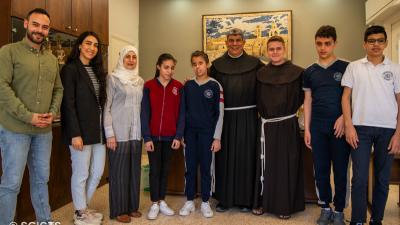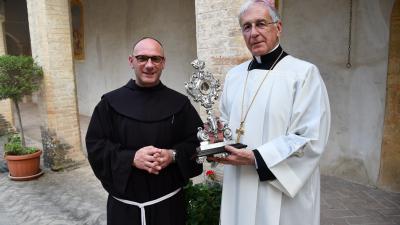
Fr. Ibrahim Alsabagh of the Custody of the Holy Land received the Jan Karski Prize for 2017 on June 26. The zealous Franciscan who works in Syria was rewarded for having “brought hope to a hopeless world.”
Since December of 2014, he has not spend a day in Aleppo without distress. And yet a day does not go by without Fr. Ibrahim Alsabagh working hard to help all those around him in Azizeih. That is why he was awarded the 2017 Jan Karski Eagle prize in Krakow, Poland, last week. This award is attributed to personalities that stand out for “humanitarian service” to others. Thus, Fr. Ibrahim was awarded “for having brought hope to a hopeless world and for having brought it to forgotten people,” as the official announcement for the event read.
In Aleppo, a city in ruins, the Franciscan priest confides to us as he collects some letters that “he alternately acts as a firefighter, a nurse, a supervisor, a teacher(...) and finally as a priest.” Since December of 2014, the priest of the Latin Parish of St. Francis of Aleppo, Fr. Ibrahim Alsabagh, is one of the last parish priests in a city that was once the economic capital of Syria and is now bleeding. This symbol city of the Syrian conflict was divided into two parts for four years, until December of 2016, after the evacuation of Islamist groups. In his diary An Instant Before Dawn, Syria, Chronicles of War and Hope From Aleppo, the Franciscan friar shares his witness of authentic anecdotes, written day after day, and speaks about the city and its inhabitants under the bombings, marked by all kinds of deprivation ...
When he received the Karski Prize, Fr. Ibrahim Alsabagh emphasized that this recognition was “an encouragement” for him in his mission of bringing “help, consolation, and hope to the people” living in the martyrs city. The prize was created in memory of a young Polish Catholic resistant, Jan Karski, who was given the task of informing the leaders of the allied countries about the situation in his country, which was occupied by the Nazis, and particularly about the situation of the Jews.
What connection can there be between this Polish prize and the Syrian matter? Fr. Alsabagh explained that “the history of the Syrian people is very similar to that of the Polish people who suffered during a certain time.” Continuing the comparison, he said, “So many people, many Christian families, following the example of Job in the Scriptures, have lost everything in an instant, the fruits of a lifetime: home, family, and health.” Today, among the inhabitants of Aleppo, Fr. Ibrahim said, “Seventy percent of families are homeless and without shelter, [and] the war continues around the city. At night we hear bombings and the gunshots. Sometimes the main road, which is also the only way to reach Aleppo, is closed due to fighting.” Fr. Ibrahim’s courage, tenacity and hope (and of the three friars who live with him) made him the winner of the Karski Prize, not with the intention of making this son of St. Francis proud, but of allowing the whole world to know the reality that is lived by the Syrian people. And this for the 40-year-old priest is a “moral duty.”
“Risking his own life”
Just as Fr. Ibrahim did not hesitate for a moment to take charge of the parish of Aleppo in December of 2014, today he does not intend to abandon his own. Even if the world collapses around him, he will stay [there] until the end despite everything, despite being offered a place in Europe, as Cardinal Dziwisz (bishop emeritus of Krakow) explained as he awarded Fr. Alsabagh, the parish priest of Aleppo originally from Damascus, “chose to return to his homeland, Syria, which has been a prisoner of war for years. He returned to consecrate himself serving Aleppo pastorally, risking his own life. “It is a partially destroyed city that is “missing everything that [people need] to survive,” the Polish Cardinal said.
It is important to note that Aleppo provided 60 percent of the country's industrial production before the conflict. The northern Syrian metropolis then had 4 million inhabitants. Today it has only 1.4 million. If Christians made up 30 percent of Aleppo’s population a few decades ago, now less than 4 percent of the population is Christian. More than 60 percent of churches have been so badly damaged that mass can no longer be celebrated in them.
Fr. Ibrahim’s book, first published in Italian for Edizioni di Terra Santa in Milan, has already been translated into several languages: German, Spanish and French. English and Dutch versions are being worked on [currently].




